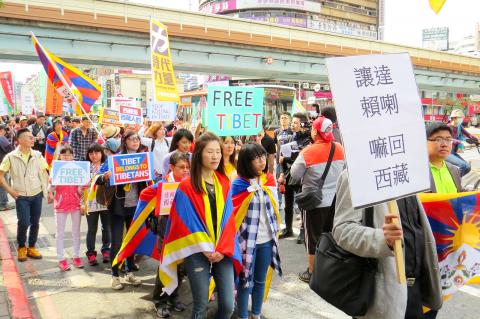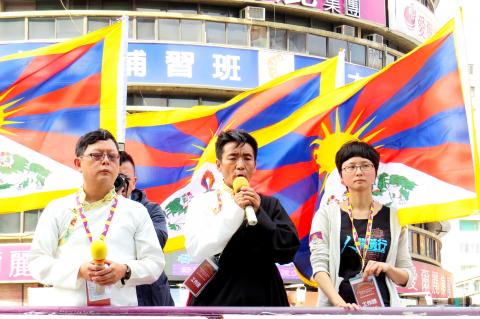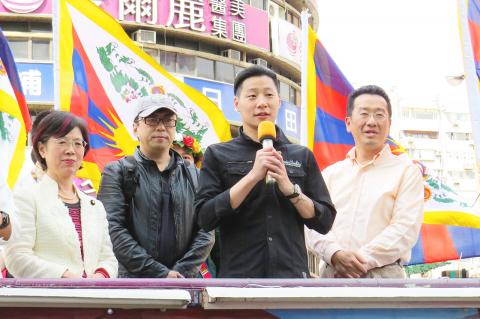More than 200 people from more 20 civic groups and lawmakers marched through downtown Taipei yesterday in a call to free Tibet and uphold human rights.
The march was to commemorate Tibetan Uprising Day — the March 10 anniversary of a failed 1959 uprising against Chinese rule — which sparked a sharp crackdown and led to the Dalai Lama’s exile.
Members of the Welfare Society for Tibetans in Taiwan (在台藏人福利協會), Human Rights Network for Tibet and Taiwan, Taiwan Association for Human Rights and other groups gathered in front of Pacific Sogo’s Zhongxiao E Road department store for a rally before setting off on the march, with numerous speeches by legislators expressing solidarity with the Tibetan cause.

Photo: Chen Yu-fu, Taipei Times
New Power Party (NPP) Legislator Freddy Lim (林昶佐) called for President Ma Ying-jeou (馬英九) and president-elect Tsai Ing-wen (蔡英文) to allow the Dalai Lama to visit Taiwan.
“President Ma has said many times that cross-strait relations have never been better, so I cannot think of a better time,” Lim said, adding that the president has cited a need to repair cross-strait ties in denying previous visits.
Ma’s government has refused to grant a visa to the Dalai Lama since his previous visit in 2009.

Photo: Chen Yu-fu, Taipei Times
Democratic Progressive Party (DPP) Legislator Tsai Yi-yu (蔡易餘) said that Tibet should serve as a “warning” of what might happen to Taiwan, calling for the Executive Yuan’s Mongolian and Tibetan Affairs Commission to be frozen to express solidarity with the Tibetan cause.
“The function of the commission is not clear and it looks like a deformity even when run by the Republic of China, because Mongolia does not belong to China anymore. That we still use the ‘Republic of China’ framework to lay claim to Tibet is at odds with their struggle for human rights and freedom,” Tsai Yi-yu said, adding that he would propose a refugee act to allow Tibetan exiles to be granted asylum.
DPP Legislator Kolas Yotaka — a Amis Aborigine elected on the party’s at-large legislative slate — said that Aborigines and Tibetans face similar challenges.

Photo: Chen Yu-fu, Taipei Times
Tibetans “are like China’s indigenous people, so we feel for them and should support them both in spirit and politically,” Kolas said, adding that Aborigines and Tibetans desire true autonomy to protect their cultures.
“We were both originally independent nations, but have been losing our political systems, social structures, religious beliefs and languages ever since colonizing powers came,” she said.
The group sang the Tibetan national anthem, while Tibetan monks prayed for a long life for the Dalai Lama before they marched away to chants of “Free Tibet” and “Long Live the Dalai Lama.”
A large portrait of the Dalai Lama led the procession, followed by more than a dozen Tibetans waving large Tibetan flags.
The group marched to the Kelti Building, which is often used to symbolize the Chinese government in the absence of a formal representative office, as it houses the offices of the Cross-Strait Economic and Cultural Interchange Association, the Bank of China and other Chinese associations and firms.
The group held a “die-in,” sprawling on the road in front of the Kelti Building in solidarity with Tibetan monks who have self-immolated to protest Chinese rule of Tibet.
The group marched to Taipei 101, saying they wanted to share their message with Chinese tourists.
Further events to mark Tibetan Uprising Day are scheduled for Thursday night at the National Chiang Kai-shek Memorial Hall’s Freedom Square and Kaohsiung’s Human Rights Learning Study.

Conflict with Taiwan could leave China with “massive economic disruption, catastrophic military losses, significant social unrest, and devastating sanctions,” a US think tank said in a report released on Monday. The German Marshall Fund released a report titled If China Attacks Taiwan: The Consequences for China of “Minor Conflict” and “Major War” Scenarios. The report details the “massive” economic, military, social and international costs to China in the event of a minor conflict or major war with Taiwan, estimating that the Chinese People’s Liberation Army (PLA) could sustain losses of more than half of its active-duty ground forces, including 100,000 troops. Understanding Chinese

The Ministry of Foreign Affairs (MOFA) yesterday said it is closely monitoring developments in Venezuela, and would continue to cooperate with democratic allies and work together for regional and global security, stability, and prosperity. The remarks came after the US on Saturday launched a series of airstrikes in Venezuela and kidnapped Venezuelan President Nicolas Maduro, who was later flown to New York along with his wife. The pair face US charges related to drug trafficking and alleged cooperation with gangs designated as terrorist organizations. Maduro has denied the allegations. The ministry said that it is closely monitoring the political and economic situation

UNRELENTING: China attempted cyberattacks on Taiwan’s critical infrastructure 2.63 million times per day last year, up from 1.23 million in 2023, the NSB said China’s cyberarmy has long engaged in cyberattacks against Taiwan’s critical infrastructure, employing diverse and evolving tactics, the National Security Bureau (NSB) said yesterday, adding that cyberattacks on critical energy infrastructure last year increased 10-fold compared with the previous year. The NSB yesterday released a report titled Analysis on China’s Cyber Threats to Taiwan’s Critical Infrastructure in 2025, outlining the number of cyberattacks, major tactics and hacker groups. Taiwan’s national intelligence community identified a large number of cybersecurity incidents last year, the bureau said in a statement. China’s cyberarmy last year launched an average of 2.63 million intrusion attempts per day targeting Taiwan’s critical

‘SLICING METHOD’: In the event of a blockade, the China Coast Guard would intercept Taiwanese ships while its navy would seek to deter foreign intervention China’s military drills around Taiwan this week signaled potential strategies to cut the nation off from energy supplies and foreign military assistance, a US think tank report said. The Chinese People’s Liberation Army (PLA) conducted what it called “Justice Mission 2025” exercises from Monday to Tuesday in five maritime zones and airspace around Taiwan, calling them a warning to “Taiwanese independence” forces. In a report released on Wednesday, the Institute for the Study of War said the exercises effectively simulated blocking shipping routes to major port cities, including Kaohsiung, Keelung and Hualien. Taiwan would be highly vulnerable under such a blockade, because it